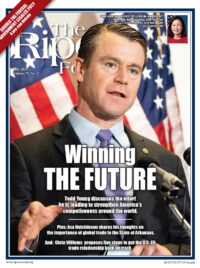
In an effort to secure and build on the already vital economic and security partnership between the U.S. and UK, the two nations embarked on negotiations for a long-desired Free Trade Agreement (FTA) last year shortly after the UK withdrawal from the European Union.
An FTA between the U.S. and the UK would also provide a great and timely opportunity to reinvigorate the global free-trade agenda. Unfortunately, the negotiations — a high priority for both President Donald Trump and Prime Minister Boris Johnson, with bipartisan support in the U.S. Congress — have been more or less derailed at this particular juncture. That needs to change. It’s time for Washington to recommit to putting a bilateral free-trade pact with London on the express track to completion.
Trade negotiations between Washington and London were formally launched in May 2020 and have proceeded apace through five rounds. The most recent came in late October 2020. However, the Biden administration’s notable unwillingness to expedite U.S-UK FTA negotiations, its divergent trade policy priorities, and the looming expiration of the current Trade Promotion Authority that allows only up-or-down votes on trade deals with no amendments, have all resulted in dimming the prospects for a U.S.-UK FTA enactment in the near term.
Not all hope is lost, however. Concrete progress has been made, and there is still strong bipartisan support for the process in Congress.
An Anglo-American trade and investment agreement would be a force generator for greater economic dynamism and prosperity. And it would play a key role in reinvigorating the global free-trade agenda.
An Anglo-American trade and investment agreement would be a force generator for greater economic dynamism and prosperity. And it would play a key role in reinvigorating the global free-trade agenda.
According to the recently released 2021 Index of Economic Freedom, The Heritage Foundation’s annual cross-country study, Brexit Britain is the world’s seventh-freest economy. More importantly, it appears economically resilient and well-positioned for a much-needed economic rebound.
Significantly, the overall UK economy has proven remarkably robust, weathering downturns caused by the COVID lockdowns and restrictions. Britain’s economy rebounded at 1 percent in the final quarter of 2020, as reported by the Office for National Statistics. By comparison, Germany grew at a mere 0.1 percent and the French economy contracted by 1.3 percent during the same period.
In the context of the coronavirus pandemic, it is all the more vital that the U.S. and UK act decisively, not only to help their own economies recover from the effects of the crisis, but to give a boost to the worldwide cause of free trade as well.
More than ever, defending and advancing trade freedom, particularly in the context of making the U.S.-UK trade deal a reality, is critical. Countries that trade openly and freely grow faster and enjoy much more widespread prosperity than those that close themselves to the worldwide flows of commerce.
It is all the more vital that the U.S. and UK act decisively, not only to help their own economies recover from the effects of the [COVID] crisis, but to give a boost to the worldwide cause of free trade as well.
Of course, the ultimate purpose of the U.S.-UK free-trade agreement is really about reinforcing the Special Relationship between two of the world’s largest and freest economies that is the beating heart of the free democratic world.
To that end, ambition in the intended scope of the trade agreement should go together with ambition to conclude it as expeditiously as possible.
The U.S. still has a chance to conclude negotiations for a free-trade pact with the U.K. in 2021. This is an opportunity that neither the U.S. nor the UK can afford to miss.
While London is doing its part, Washington can and should reprioritize the paused negotiations for an FTA between both nations. Achieving that practical and strategic goal will not only benefit America economically, but also contribute to advancing the cause of freedom and security around the world.
Anthony B. Kim is research manager and editor of the Index of Economic Freedom and in the Center for International Trade and Economics (CITE) at The Heritage Foundation (heritage.org). Terry Miller is the director of CITE and Mark A. Kolokotrones Fellow in Economic Freedom at Heritage.




